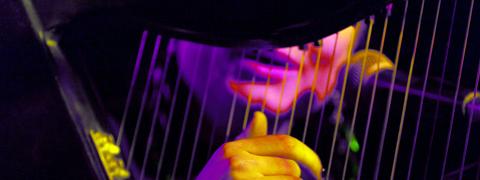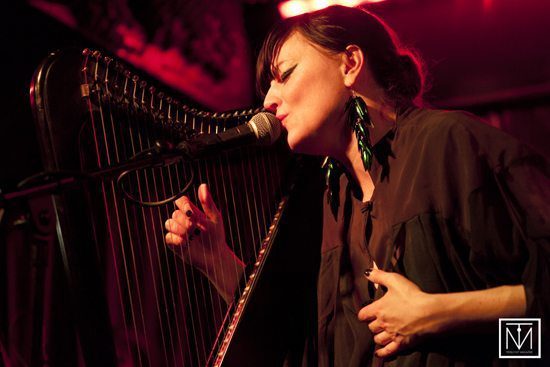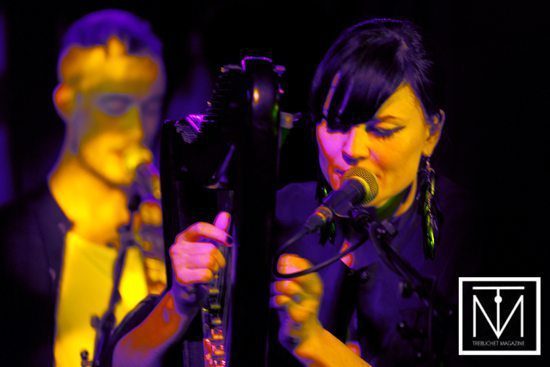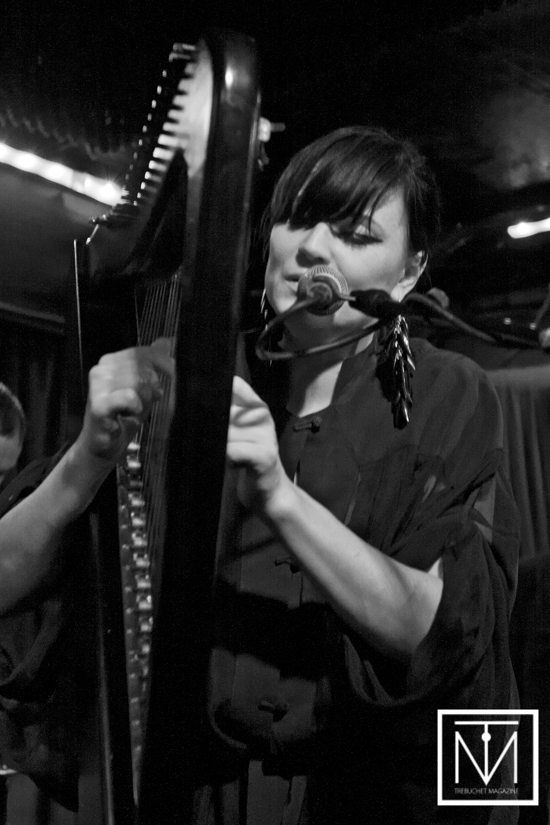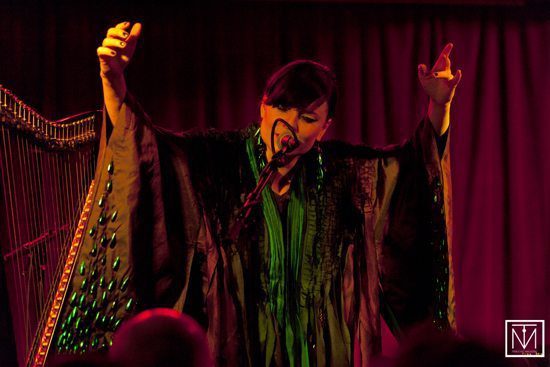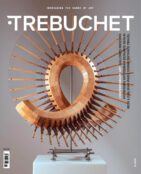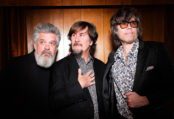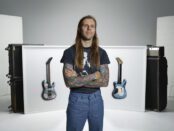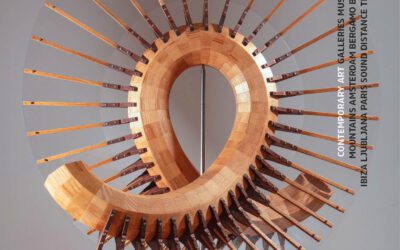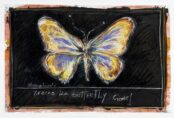Scandinavian singer-songwriter and world traveller, Rebekka Karijord is on a journey that may well leave the world at her bare feet.
Her latest album, the acclaimed We Become Ourselves, was MOJO’s world music album of the month for November and her fanbase is growing steadily.
Now living in Sweden but born in Norway, she was raised by her artist mother and spent her childhood travelling to numerous countries, as well as acting, dancing, singing, writing, composing and playing several instruments. That exposure to different cultures is reflected in the diversity of her music.
Too eclectic to be considered pop, but not fitting neatly into the categories of either world music or folk, her solo work has a spiritual and atmospheric quality, capturing an essence of the natural world, perhaps unsurprising given that she has also written film soundtracks for years. In addition to playing keyboards and harp, she uses her voice both to communicate her considered lyrics and as an instrument in its own right.
Rebekka: The human voice is my favourite instrument of all time, it’s so versatile and it’s so flexible, it’s amazing what you can express with the human voice and I feel like I’ve only started to explore a tiny bit of my voice. It’s getting older too, I’ve noticed, I really like that, I’ve sunk a bit in pitch, it’s so attached to your development as a human.
Did she have any classical singing training?
Rebekka: When I was younger, but I didn’t like it. I actually feel like it stood in the way of my voice developing rather than helping me. My little sister is 19 and she has an amazing voice and I’m saying to her, don’t take singing lessons! Of course there are good teachers as well, but for my sake it was, I needed to just let go of control and let go of self-consciousness and let go of my head and be in the body and then my voice started to bloom.
That’s quite recent, I mean it’s only 4 or 5 years ago I feel like I started to achieve that.
Does she feel that she is early on in her career?
Rebekka: That’s the weird part about music. I find it so absurd that in all other art forms you’re expected to be a novice in the beginning, like in your 20s, but in music you’re expected to be this full, blooming, finished artist when you’re 22. It’s not really accurate, I mean if you have a big breakthrough then I think you’re going to have a crisis later. I want to make music my whole life and I don’t think I’ve made my best album by far.
Many articles about Rebekka Karijord have focused on her troubled family history – her traveller parents split up when she was a small child and for many years her father was absent and suffering from addiction to heroin. I asked her about the influence this has had on her work and how she feels about having her personal life so widely reported.
Rebekka: I think when it comes to what the press maybe regards as really personal, to me it’s not that private because it’s very processed in me and it’s thought through what I want to give and what I don’t want to give. So that’s just the tip of the iceberg with a lot of things and it happens all the time with questions that I think, ‘uh-oh I went too far’.
I’m quite a cautious person but I think I realised that one of my weaknesses as an artist has been that I don’t show vulnerability, up to now. On the last record which has kind of started to do things for me. It was my third album, but my first solo album, and it was the first time I dared to be personal and vulnerable on record. I realised that as I got stronger and more confident as a person it was easier to show my weak sides and my weak spots.
I think also that it’s very natural for me to talk about these things because I do believe that everyone, not only creative people but artists maybe in particular, have this weak spot or this vulnerable spot that they circle around their whole life and try to understand, and they attack it from different angles. Whether as a writer or a painter or a songwriter, you try to get to this point where there’s something that in yourself that hurts and you can’t get a grip of, you can’t grasp it, and for me that’s definitely something of a turmoil for music.
It’s a simplification but I think it’s a lot about growing up without a kind of fulfilled love around me.
So is anything off limits?
Rebekka: Not in songs. I think I would be able to bring up anything in songs but the weird thing about writing songs for me is that the moment I write them, I feel what I’m talking about and I can get really sad at times and be really hit by it, but then the moment I meet my musicians in the studio and I record it and it’s caught on tape, it’s gone. 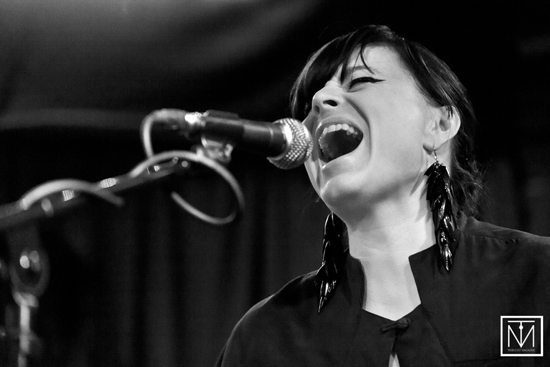
I think that it’s really important to be able to go up on stage and do those songs every night because if I went up crying then I wouldn’t be able to proceed with it. The moment it’s on tape then it’s all about the audience, they own the songs then. For me, in a way, it becomes someone else’s. I get letters about certain songs. On this album it’s ‘Oh Brother’ that hits a spot, especially in men.
On the last album it was ‘Wear It Like A Crown’ and that’s become an anthem for freaks a bit. I’m a freak myself in that sense, you do feel on the outside of society and a geek but there’s all these people who feel they don’t fit in who love that song and I absolutely adore that, it’s great.
Was that an inspiration for covering ‘Smells Like Teen Spirit’ by Nirvana? Did Kurt Cobain reflect that feeling of being an outsider and a freak?
Rebekka: Yeah, he appealed to me, I remember when I was younger and they were big. I was very compelled by the whole grunge scene, Elliott Smith in particular, but the whole scene was very inspiring. I think also when it came to ‘Smells Like Teen Spirit’, it was one of those challenges that I like to give myself sometimes. Is this possible, it’s so far from me? I’m not playing that so much anymore because it is a tricky one to pull off; it’s on the edge of getting cheesy.
How did she feel about being MOJO’s world album of the month – would she put her work in that category?
Rebekka: No, I think there’s no-one else who’d put the music in that category, but I took it as a compliment because there’s so many pop musicians to squeeze into that category so I think they put me there to fit me in. I thought that was very nice of them.
I listen to world music but it has to be very good world music, not some fusion. I like the real style, there’s a lot of African music that I really appreciate for example. I’ve been to Eastern Africa a lot and I’ve done projects where I try to collect material for the films that I do especially if they’re linked to different parts of the world, then I go there and do research.
I want to explore the voices more, I would like to work more with other singers and I would also like to incorporate the contacts and the experience I have, for example in the Middle East region maybe. So I have some ideas and I want to make world music. I would like to record a lot of different voices at some point and see how I can use it in my own music.
I asked her how all the early travelling had affected her.
Rebekka: I think it made me more socially skilled, but it’s like with all those things in your childhood that shape you. It’s like flip sides of both strength and weakness and it’s also made me very restless. I think that’s partly why I’m a late bloomer as a musician because I’ve been bad at riding the wave, I’ve been jumping off, I’ve been a lot of doing different things, I’ve been very impatient and I had a lot of things I wanted to do.
I’ve been scattering my focus too much and now a few years ago I was like ‘OK, now I’m really focused and now I’m challenging myself to stay in one place and let it breathe a bit and see what happens’ and that was very good for my music. I think that comes from my childhood a bit.
Will she still be writing soundtracks or solely focusing on her solo material from now on?
Rebekka: Now it’s all music but I still write soundtracks and that’s for several reasons. Partly because I love it and love working with the films. Before that I was writing plays and acting up until 5 years ago, I’ve been acting since I was 12 years old. The acting and the music went hand in hand until 5 years ago. The score writing, partly it’s really nice to get the possibility to choose projects that I feel are something bigger than me.
The last film is I did is a documentary about paperless immigrant underage boys in Scandinavia and how they are being treated by the very privileged Norway, and I’ve been to the Middle East working with human rights projects. It’s very rewarding for me on a deep personal level to get a bit away from myself and from my thoughts. There’s another aspect too that it’s very difficult to live from record sales and from touring these days, so writing scores is my other job.
So is the political activity and engagement important to her?
Rebekka: Yes, it is, especially the human rights and the global aspect, they go hand in hand. But I think I’ve always been quite local in my focus and I think that had something to do with my upbringing as well. I saw a lot of things since I was quite young because of my father and because of the circumstances around me that I think made me quite angry about unfairness in society.
I remember reflecting a lot when I was little, why are they on the inside and why are they on the outside? That could be me or that could be my mom, it’s such a thin line, who’s accepted and who’s not, so I think that might be the fuel for it. I want to work with human rights and socialistic projects. I feel Scandinavia is a very privileged part of Europe and there is such a history-less attitude in a way.
Only a few generations ago, our grandparents emigrated to the US to find a better life and now there are all these people searching for asylum or searching for a place to live who have way better reasons, and not only are we neglecting very many, but we are treating the ones that we let in very badly. There’s a lot of racism in Scandinavia. So I guess that’s one issue and I’m concerned about the increase in Islamaphobia and the diversity between the West and the East and how that’s going to develop.
Again it’s a very history-less way of looking upon ourselves, it’s quite recent. If you look upon the way the Jews were treated during the Second World War, and now Israel and Palestine, it’s a big thing. I do feel like I want to be political but I’m not a super rhetorical political person but I do believe that music can be political, not in the sense that I want to sit down and write a song about a Palestinian refugee camp but in the sense that I do think that the personal is very political.
I’ve gone there and played my songs and I’ve really felt that it’s amazing how music can be such a unifying force.
Given that she has described ‘We Become Ourselves’ as being predominately about masculinity and her relationship with males, and has said that her next album will be about femininity, to what extent do gender issues influence her work?
Rebekka: I’m quite interested in that aspect these days but that again comes from a personal place. I’ve been stating out loud that I’m making a project that this is the male album and the next is the female album but it’s not a political agenda, it’s more of a personal project for me. It’s research because I grew up with not many men around me. I didn’t feel like a woman until quite late, I didn’t see myself in terms of gender. I can applaud my mom maybe for that; she raised me in a good way in that sense.
[quote]I didn’t feel like a woman until quite late[/quote]
I remember moving to Sweden, which is a very feminist country. In Norway you don’t talk much about feminism. I moved there [Sweden] when I was 19 and was totally shocked by this militant feminism and that’s something that I’m still researching in that aspect: how it is to be a woman, how it is to be a female artist, how it is to be a female musician getting more mature, how I’m being treated.
I do believe that if you look for suppression, then you get more suppressed. You can also be like, ‘fuck no, I’m going to do it anyway, get out of my way’ and I think that’s how I’ve been a lot.
At The Borderline, Rebekka Karijord commands the stage, her wizardlike sleeves enhancing her shamanic presence. She moves with ease between keyboards and harp and despite her earlier comments to me about needing to disconnect from the more personal songs, she certainly gives the impression of total engagement in the material.
The audience are transfixed. Often likened to Kate Bush, as she leans over her keyboard on stage one can imagine her singing about Heathcliff running around moors and dales but on closer inspection, this comparison seems a tad superficial, based perhaps on a slight physical resemblance and the perceived eccentricity of intelligent women having the nerve to play their own instruments and sing their own songs.
Rebekka Karijord’s vocal performance, both live and on record, has a depth and diversity that Bush lacks. There are elements of fellow Scandinavian Bjork with the mixing of styles and wide vocal range and techniques, as well as the emotion of PJ Harvey, the haunting aspects of Portishead and the ethereality of Enya, but ultimately Rebekka Karijord has found a voice of her own.
Rebekka Karijord played The Borderline, London, On January 16th.
Photos: Carl Byron Batson

